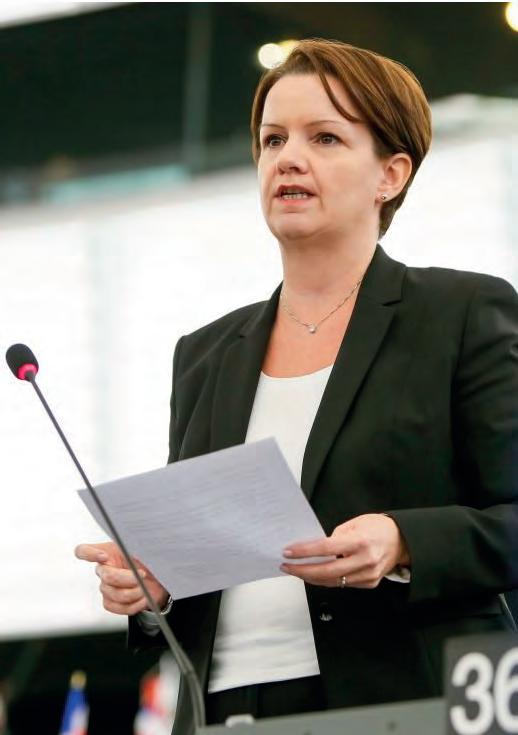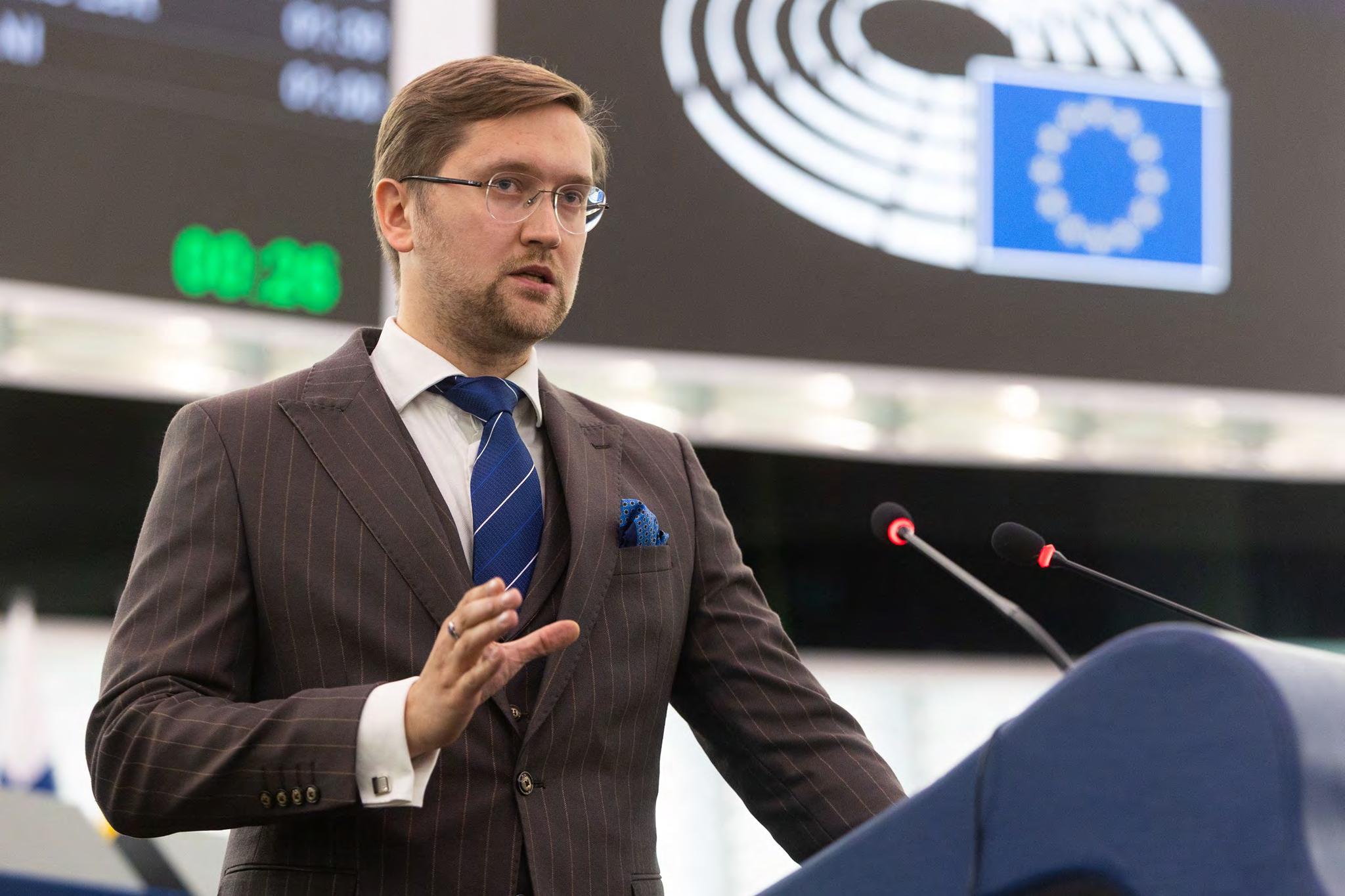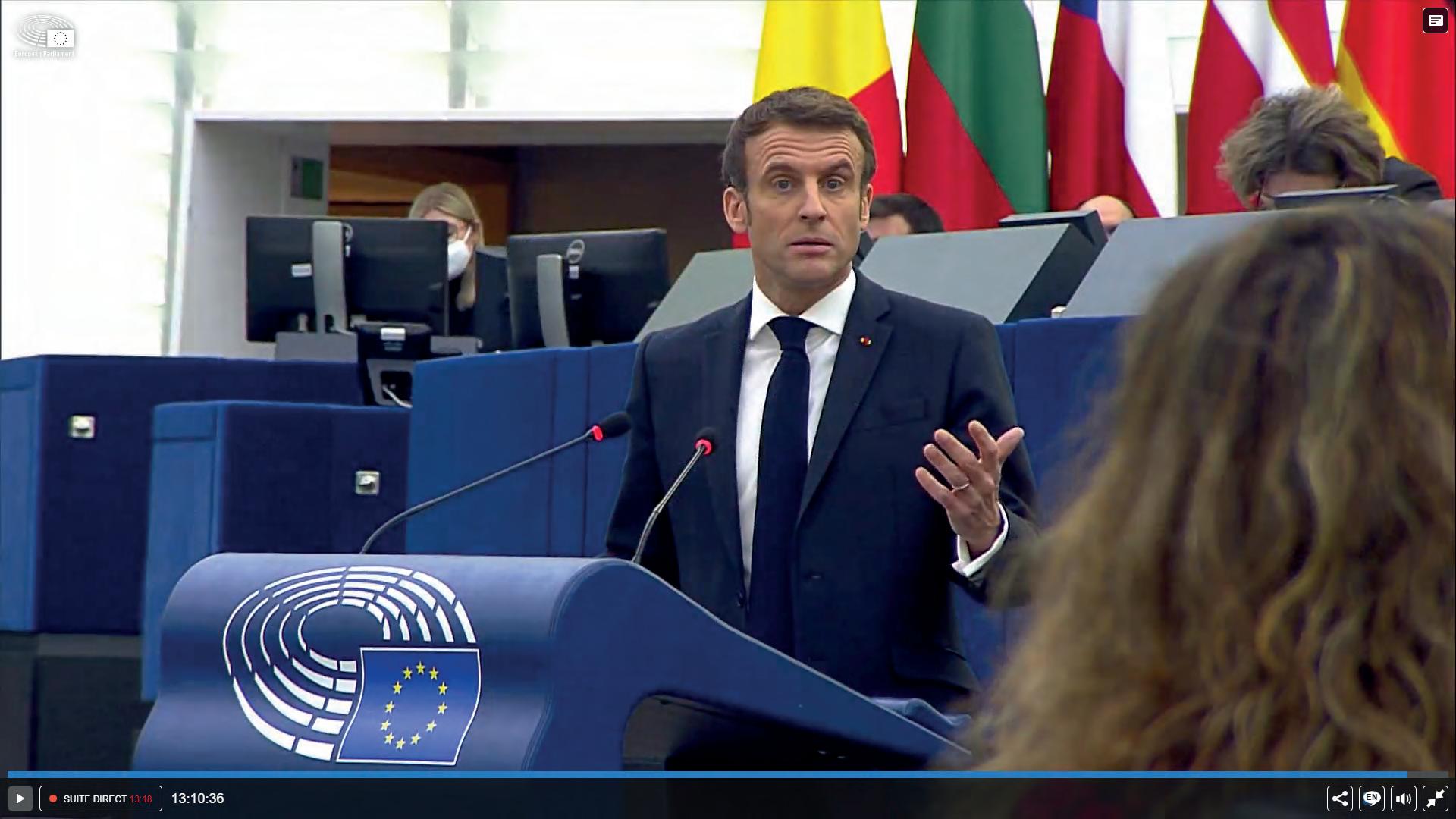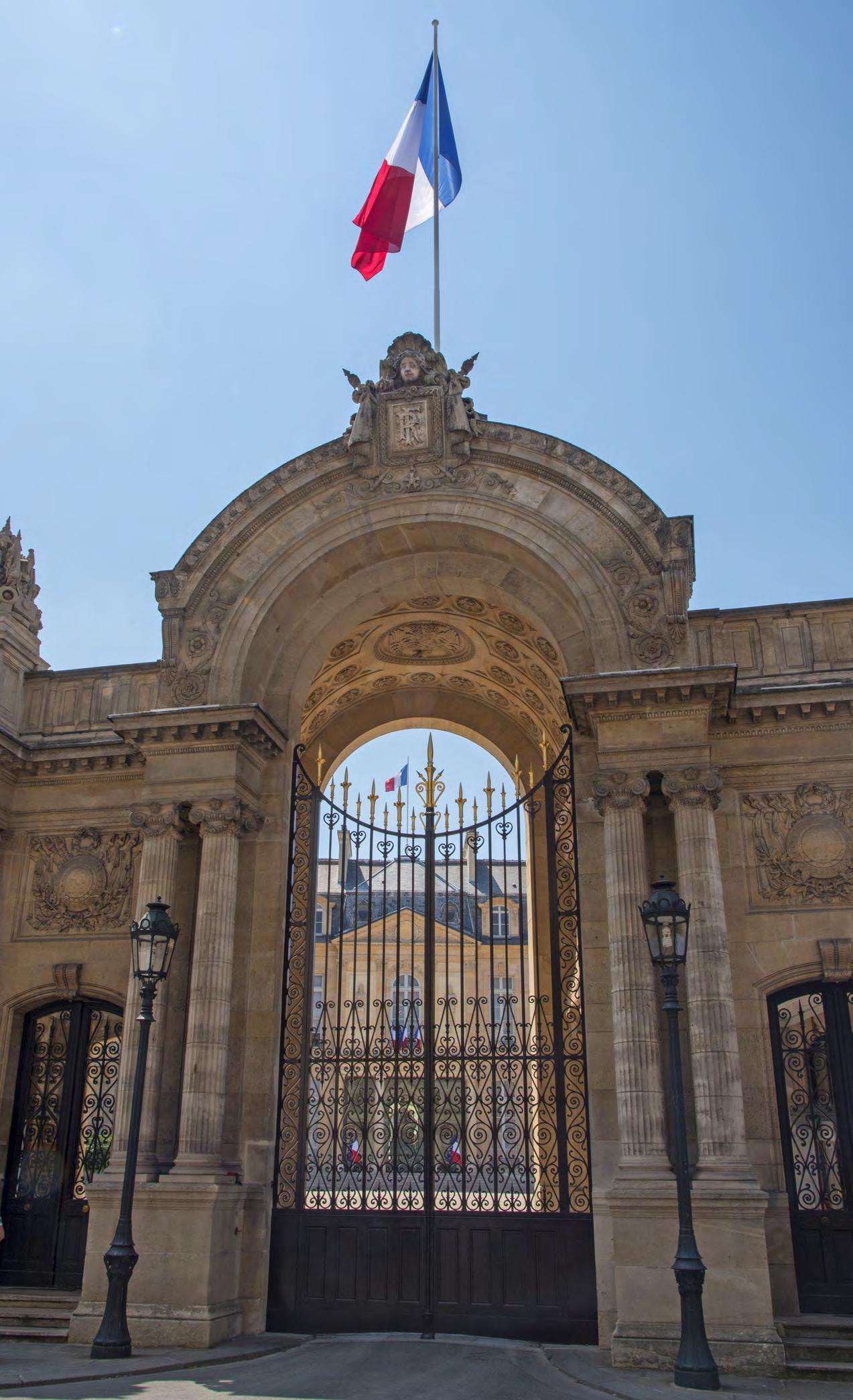
12 minute read
Euroopa tuleviku konverents föderalistlik farss
Few European citizens have heard of it, but the Conference on the Future of Europe was nevertheless announced with great fanfare by the European Union authorities. e barely-concealed objective is to continue the European Union's headlong rush towards greater federalism. Several members of the ID Party are defending you: Hélène Laporte (France), Catherine Griset (France), Philippe Olivier (France), Mara Bizzotto (Italy), Alessandro Panza (Italy), Susanna Ceccardi (Italy), Gerolf Annemans (Flanders), Jaak Madison (Estonia), Ludovit Goga (Slovakia), and Petra Steger (Austria)
Advertisement
e EU has selected ten themes for debate: climate change and the environment; health; a stronger economy, social justice and employment; the EU in the world; values and rights, rule of law and security; digital transformation; European democracy; migration; education, culture; youth and sport.
If the gures are to be believed, it’s a total failure. In total, 38,000 people participated (out of 450 million inhabitants), often leaving a brief message at most. On the topic of migration, barely 500 citizens gave Vähesed Euroopa kodanikud on sellest kuulnud, kuid Euroopa Liidu ametivõimud kuulutasid Euroopa tuleviku konverentsi siiski fanfaaride saatel välja. Vaevu varjatud eesmärk on jätkata Euroopa Liidu pea ees kiirustamist suurema föderalismi suunas. Mitu ID partei liiget kaitsevad teid: Hélène Laporte (Prantsusmaa), Catherine Griset (Prantsusmaa), Philippe Olivier (Prantsusmaa), Mara Bizzotto (Itaalia), Alessandro Panza (Itaalia), Susanna Ceccardi (Itaalia), Gerolf Annemans (Flandria), Jaak Madison (Eesti), Ludovit Goga (Slovakkia) ja Petra Steger (Austria).
EL on valinud aruteluks kümme teemat: kliimamuutus ja keskkond; tervishoid; tugevam majandus, sotsiaalne õiglus ja tööhõive; EL maailmas; väärtused ja õigused, õigusriik ja julgeolek; digipööre; Euroopa demokraatia; ränne; haridus, kultuur; noored ja sport.
Kui arve uskuda, siis oli see täielik läbikukkumine. Kokku osales 38 000 inimest (450 miljonist elanikust), kes jätsid sageli lühikese sõnumi. Rände teemal avaldas arvamust vaevalt 500 kodanikku, kes jätsid sageli rändevastase sõnumi.
their opinion, often leaving an anti-migration message.
It seems a long time ago that the Conference was launched with such great fanfare, when for example a convinced federalist called for two ags to be own at the Olympic Games: the national ag and the twelve stars.
e very organisation of the debates is a joke. e European Parliament is represented and each country sends representatives from its national parliament. e allocation of speaking time is left to the discretion of the administration. During the last plenary, a Member of the European Parliament from the Identity and Democracy Party was given time to speak on the important subject of the digital transition, but was not chosen by the representative in question. e citizens' panels seem to be hand-picked to ensure that the discourse never deviates from o cial thinking.
Conclusions will be drawn from this mess, which we can already con dently predict right here and now: we will need more and more Europe and federalism. e Identity and Democracy Party will never subscribe to such a vision, as it favours sovereign peoples and national identities.
While at the beginning we were optimistic, we were quickly disillusioned and had to face the fact that this Conference was a farce. Tundub, et kaua aega tagasi käivitati konverents nii suure fanfaariga, kui näiteks veendunud föderalist nõudis, et olümpiamängudel heisataks kaks lippu: riigilipp ja kaksteist tähte.
Juba arutelude korraldus on nali. Euroopa Parlament on esindatud ja iga riik saadab oma riigi parlamendi esindajad. Kõneaja eraldamine on jäetud administratsiooni otsustada. Eelmisel täiskogu istungil anti Euroopa Parlamendi liikmele erakonnast Identiteet ja Demokraatia aega rääkida olulisel digipöörde teemal, kuid kõnealune esindaja ei valinud teda. Kodanike paneelid näivad olevat spetsiaalselt valitud, tagamaks, et diskursus ei kalduks kunagi kõrvale ametlikust mõtteviisist.
Sellest segadusest tehakse järeldused, mida me võime juba praegu enesekindlalt ennustada: me vajame üha rohkem Euroopat ja föderalismi. Identiteedi ja Demokraatia partei ei nõustu kunagi sellise visiooniga, sest see soosib suveräänseid rahvaid ja rahvuslikku identiteeti.
Kuigi alguses olime optimistlikud, olime kiiresti pettunud ja pidime tunnistama fakti, et see konverents oli farss.
Mara Bizzotto: „Täna on meil vaja üles ehitada uus Euroopa mudel, inimeste Euroopa ...“
Mara Bizzotto is a Member of the European Parliament for Lega (Italy)
“ e Conference on the Future of Europe was a historic opportunity to rebuild Europe and design the Europe of tomorrow: it was an important chance that we had to seize, with the courage and foresight to make major changes, including the necessary reform of the European treaties.
We need to work together to change the current model of Europe at its roots, a model that has proved to be wrong and too far removed from the real needs of our citizens and territories, as we have also seen during the Covid emergency.
What we need today is to build a new model of Europe, a Europe of the people, of the citizens, of work and of true democracy, which will put a de nitive end to the Europe of austerity, of the banks and of this bureaucracy which has done so much harm to our countries in recent years.” Mara Bizzotto on Euroopa Parlamendi liige, Lega erakonna saadik (Itaalia)
„Euroopa tuleviku konverents oli ajalooline võimalus Euroopa ülesehitamiseks ja homse Euroopa kujundamiseks: see oli oluline võimalus, mida me pidime kasutama, julguse ja ettenägelikkusega teha suuri muudatusi, sealhulgas Euroopa aluslepingute vajalik reform.
Me peame tegema koostööd, et muuta praegust Euroopa mudelit selle juurtes, mudelit, mis on osutunud valeks ja liikunud liiga kaugele meie kodanike ja territooriumide tegelikest vajadustest, nagu me oleme näinud ka COVID-19 hädaolukorra ajal.
Täna on meil vaja ehitada uus Euroopa mudel, inimeste, kodanike, töö ja tõelise demokraatia Euroopa, mis teeb lõpu kokkuhoiu, pankade ja bürokraatia Euroopale, mis on meie riikidele viimastel aastatel nii palju kahju teinud.“

Petra Steger: “My vision of Europe is an association of free and self-determined peoples in which the diversity of cultures is seen as a strength and not an obstacle...”
Petra Steger is a Member of the National Council (Austria) for Freiheitliche Partei Österreichs and participates in the Conference on the Future of Europe
“A respectful and united cooperation according to the principles of subsidiarity and federalism should guarantee the freedom of each nation State.
On the other hand, I categorically reject the path towards a central EU political state, coupled with massive undesirable developments such as the debt and transfer union, EU taxes, losses of national sovereignty or accession negotiations with non-European countries such as Turkey. A return to the real tasks of the EU is needed, namely to ensure peace, freedom and prosperity. Petra Steger on Austria Rahvusnõukogu liige, Freiheitliche Partei Österreichs erakonna saadik ja osaleb Euroopa tuleviku konverentsil
„Minu nägemus Euroopast on vaba ja ennast määratlevate rahvaste ühendus, kus kultuuride mitmekesisust nähakse tugevusena, mitte takistusena. Subsidiaarsuse ja föderalismi põhimõtetele vastav austav ja ühtne koostöö peaks tagama iga rahvusriigi vabaduse.
Teisest küljest lükkan ma kategooriliselt tagasi tee EL-i keskse poliitilise riigini koos tohutute ebasoovitavate arengutega, nagu võlgade ja ülekannete liit, EL-i maksud, riikliku suveräänsuse kaotamine või ühinemisläbirääkimised selliste kolmandate riikidega nagu Türgi. Vaja on naasta EL-i tegelike ülesannete juurde, nimelt tagada
“I categorically reject the path taken towards a central EU political state”


However, the EU will only remain an order of peace if the components of security and freedom are not forgotten. is means nothing less than self-determination. But it is precisely this self-determination which is increasingly being lost as the EU continually seeks to take over national competences and transform itself into a centralised state. is is also leading to a growing rejection by the citizens. Europe is important, but it can never replace the Nation.” rahu, vabadus ja heaolu.
EL jääb siiski rahu orduks ainult siis, kui julgeoleku ja vabaduse komponente ei unustata. See ei tähenda midagi vähemat kui enesemääramist. Kuid just seda enesemääramisõigust kaotatakse üha enam, kui EL püüab pidevalt üle võtta riiklikke pädevusi ja muuta end tsentraliseeritud riigiks. See toob kaasa ka kodanike üha suureneva tõrjumise. Euroopa on tähtis, kuid see ei saa kunagi asendada rahvast.“
Jaak Madison is a Member of the European Parliament for Eesti Konservatiivne Rahvaerakond (Estonia)
“When we speak of the future of Europe, it is important to remember that we are talking rst and foremost about the future of the European Union, not of Europe as a whole. Switzerland, Norway or Iceland are as European and often more so than any EU Member State or the European Commission. I am not optimistic about the long-term viability of the European Union.
e more the European Union tries to seize power and reduce the sovereignty of Member States, for example in environmental, economic, defence or foreign policy, the more likely it is that the Union will eventually collapse.
Unfortunately, the European Commission and the European Parliament have not been able to recognise the mistakes which led Britain, for example, to leave the Jaak Madison on Euroopa Parlamendi liige, Eesti Konservatiivse Rahvaerakonna saadik (Eesti)
„Kui me räägime Euroopa tulevikust, on oluline meeles pidada, et me räägime eelkõige Euroopa Liidu tulevikust, mitte Euroopast tervikuna. Šveits, Norra ja Island on sama euroopalikud ja tihtipeale rohkemgi kui ükski teine EL-i liikmesriik või Euroopa Komisjon. Ma ei ole Euroopa Liidu pikaajalise elujõulisuse suhtes optimistlik.
Mida rohkem püüab Euroopa Liit võimu haarata ja vähendada liikmesriikide suveräänsust näiteks keskkonna-, majandus-, kaitse- või välispoliitikas, seda tõenäolisem on, et liit lõpuks kokku kukub.
Kahjuks ei ole Euroopa Komisjon ja Euroopa Parlament suutnud tunnistada vigu, mille tõttu näiteks Suurbritannia liidust lahkus. Euroopa Liidu tulevik on võimalik ainult siis, kui naaseme liidu algsete juurte juurde, milleks on majanduslik koostöö ja kaupade vaba liikumine.


Union. e future of the European Union is only possible if we return to the original roots of the Union, which are economic cooperation and the free movement of goods. is means abandoning federalist policies in areas which have absolutely no connection with free trade and economic relations.” See tähendab föderalistliku poliitika hülgamist valdkondades, mis ei ole absoluutselt seotud vabakaubanduse ja majandussuhetega.“
Euroopa Liidu Nõukogu eesistujariik Prantsusmaa keset presidendikampaaniat: kus on õiglus?

e French Presidency of the Council of the European Union in the middle of a presidential campaign: where is the fairness?
Since 1 January, France has held the rotating presidency of the Council of the European Union, in accordance with the mechanism whereby each member country takes it in turn to hold the o ce.
Whether it’s a coincidence or not, it comes at the same time as the presidential campaign, allowing Emmanuel Macron to appear in the spotlight.
If we can ask ourselves the question of fairness in relation to the other candidates - including Marine Le Pen - we can hope that this European Alates 1. jaanuarist on Prantsusmaa olnud Euroopa Liidu Nõukogu vahetuv eesistujariik vastavalt mehhanismile, mille kohaselt iga liikmesriik on vaheldumisi eesistuja.
Kas see on kokkusattumus või mitte, aga see tuleb samal ajal kui presidendikampaania, lubades Emmanuel Macronil olla tähelepanu keskpunktis.
Kui suudame endalt küsida õigluse küsimuse teiste kandidaatide suhtes – sealhulgas Marine Le Pen –, võime loota, et see Euroopa vahemäng annab võimaluse kahe Euroopa
interlude will be an opportunity for two visions of Europe to face o : on the one hand, the federalist project intending to make Europe the stepping stone to globalisation, and on the other hand, a national programme rooted in and respectful of identities.
For Emmanuel Macron has never hidden his intention to drown the French identity - in which he has never believed - in the European melting pot, to the point of speaking of “European sovereignty” and thereby sweeping away the very idea of national sovereignty. nägemuse vastasseisule: ühelt poolt föderalistlik projekt, mille eesmärk on muuta Euroopa globaliseerumise hüppekiviks, ja teiselt poolt identiteedile tuginev ja seda austav riiklik programm.

Sest Emmanuel Macron ei ole kunagi varjanud oma kavatsust uputada Prantsuse identiteet – millesse ta ei ole kunagi uskunud – Euroopa sulatusahju, kuni „Euroopa suveräänsusest“ rääkimiseni, ja pühkida sellega minema idee riiklikust suveräänsusest.
Konkreetselt usaldatakse
In concrete terms, France's powers will be increasingly entrusted to Europe, especially in military terms, since the current French president hopes to establish a common defence policy in both strategic and operational areas. In other words, the idea of a European army is never far o .
He will certainly be able to count on the support of the new German Chancellor Olaf Scholz, whom he has already met, and who has “great ambitions for Europe.” Germany has already announced its intention to “see the European Union evolve into a European federal state.” It is therefore to be feared that the Franco-German couple, the Sarkozy-Hollande/Merkel yesterday, the Macron/Scholz today, will continue to dismantle the national ideal. e French presidential election could change things: with Marine Le Pen in the Elysée, things would certainly take a turn for the better.
As a symbol, while France was preparing to take over the presidency of the Council of the European Union, the government in power had the French ag replaced by the European ag under the Arc de Triomphe, where the Unknown Soldier, who died for the country, is buried. It had to be removed after two days. “A patriotic victory,” according to Marine Le Pen. We can hope that she will announce another one in April! Prantsusmaa volitused üha enam Euroopale, eriti sõjalises mõttes, sest praegune Prantsusmaa president loodab luua ühise kaitsepoliitika nii strateegilistes kui ka operatiivsetes valdkondades. Teisisõnu, Euroopa armee idee ei ole kunagi kaugel.
Kindlasti saab ta loota Saksamaa uue kantsleri Olaf Scholzi toetusele, kellega ta on juba kohtunud, ja kellel on „suured ambitsioonid Euroopa jaoks“. Saksamaa on juba teatanud oma kavatsusest „näha Euroopa Liidu arenemist Euroopa föderaalriigiks“. Seetõttu tuleb karta, et Prantsuse-Saksa paar Sarkozy-Hollande/Merkel eile, Macron/Scholz täna jätkab rahvusliku ideaali lammutamist. Prantsusmaa presidendivalimised võiksid asju muuta: kui Marine Le Pen oleks Elysées, võtaksid asjad kindlasti parema pöörde.
Samal ajal, kui Prantsusmaa valmistus Euroopa Liidu Nõukogu eesistujaks saama, asendas võimul olev valitsus Prantsusmaa lipu Euroopa lipuga Trium kaare all, kuhu on maetud tundmatu sõdur, kes riigi eest suri. See tuli kahe päeva pärast eemaldada. „Patriootlik võit,“ ütles Marine Le Pen. Loodame, et ta kuulutab aprillis välja veel ühe!




